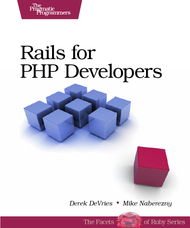Rails for PHP Developers book review
 The e-book version of the Pragmatic Programmers release Rails for PHP Developers written by Derek DeVries and Mike Naberezny occupies now some of my scarce hard drive space for several months, and today I managed to hit the last page of it. In case you're interested in knowing if it's worthy to sacrifice some rare hard drive or bookshelf space for this book read on.
The e-book version of the Pragmatic Programmers release Rails for PHP Developers written by Derek DeVries and Mike Naberezny occupies now some of my scarce hard drive space for several months, and today I managed to hit the last page of it. In case you're interested in knowing if it's worthy to sacrifice some rare hard drive or bookshelf space for this book read on.
What's in it?
The book consists of three main parts which are addressing open-minded developers with a PHP background tempted to add the Ruby language and the thereupon built Rails 2.0 framework to their toolset.The first part introduces the classic and nowadays omnipresent MVC pattern, the concepts and conventions of Rails by converting a simple PHP newsletter application into a Rails based one. The follow-up chapters of the first part are covering the basics of the Ruby language by looking at known PHP language features and constructs, and how they translate to their Ruby counterparts. Reading these chapters you will get a thorough understanding of the Ruby language and be able to apply unique features like blocks or the reopening of existing classes. The communicated knowledge builds the foundation to accelerate the use and understanding of the Rails framework which is covered in-depth through-out the book's second part.
While teaming up with their imaginary buddy Joe the authors walk you through building a Rails user group application. The chapters of the second part are covering a lot of ground reaching from domain modeling, putting the particular MVC parts to work, ensuring quality by utilizing the Test::Unit library to finally deploying the application into a
The first two chapters of the final and reference part cover the differences and similarities between PHP and Ruby data structures, operations and language constructs. The final chapter of the book closes with a web development specific comparision of PHP constructs and approaches to the ones used by the Rails framework. The book is accompanied by a dedicated blog and a PHP to Rails online reference to satisfy severe thirst for more knowledge.
Conclusion
The book provides interested PHP developers a thorough introduction to the Ruby language and the Rails framework in a fluent and enjoyable writing tone. By implementing the example application of the second book part any decent PHP developer will derive a solid understanding of the Rails framework, he can build upon and that puts him in the position to make reasonable judgments for using/flaming it or not. IMHO this book is so far one of the best PHP related book releases of the out fading year 2008, and can be a real motivator to extend the just gained knowledge by diving deeper into the Ruby/Rails ocean.So be prepared to see one or another Ruby related post popping up in the future timeline of this blog; I just added another costly addiction to the medicine cupboard. Word!
2 comments:
I read it a couple of months ago and it's excellent. I'm now reading Practical Django Projects, another one that I highly recommend.
If the book mentions "deploying the application into a productive environment", I can't read it. They have no idea if my environment is productive or counter-productive. Oh sure, I could deploy it to a "production environment", but what fun would that be? There are no lazy people to watch me do it!
Post a Comment